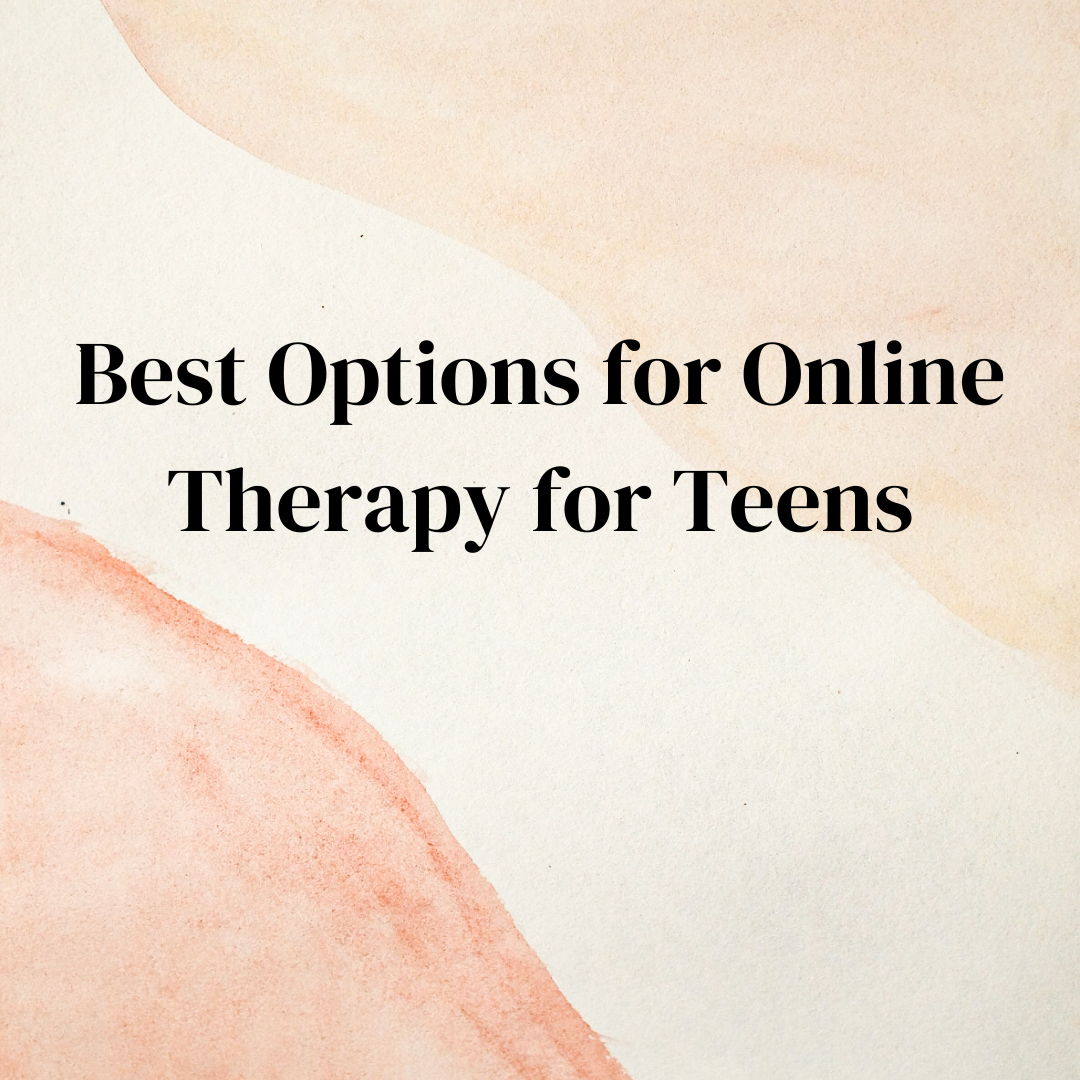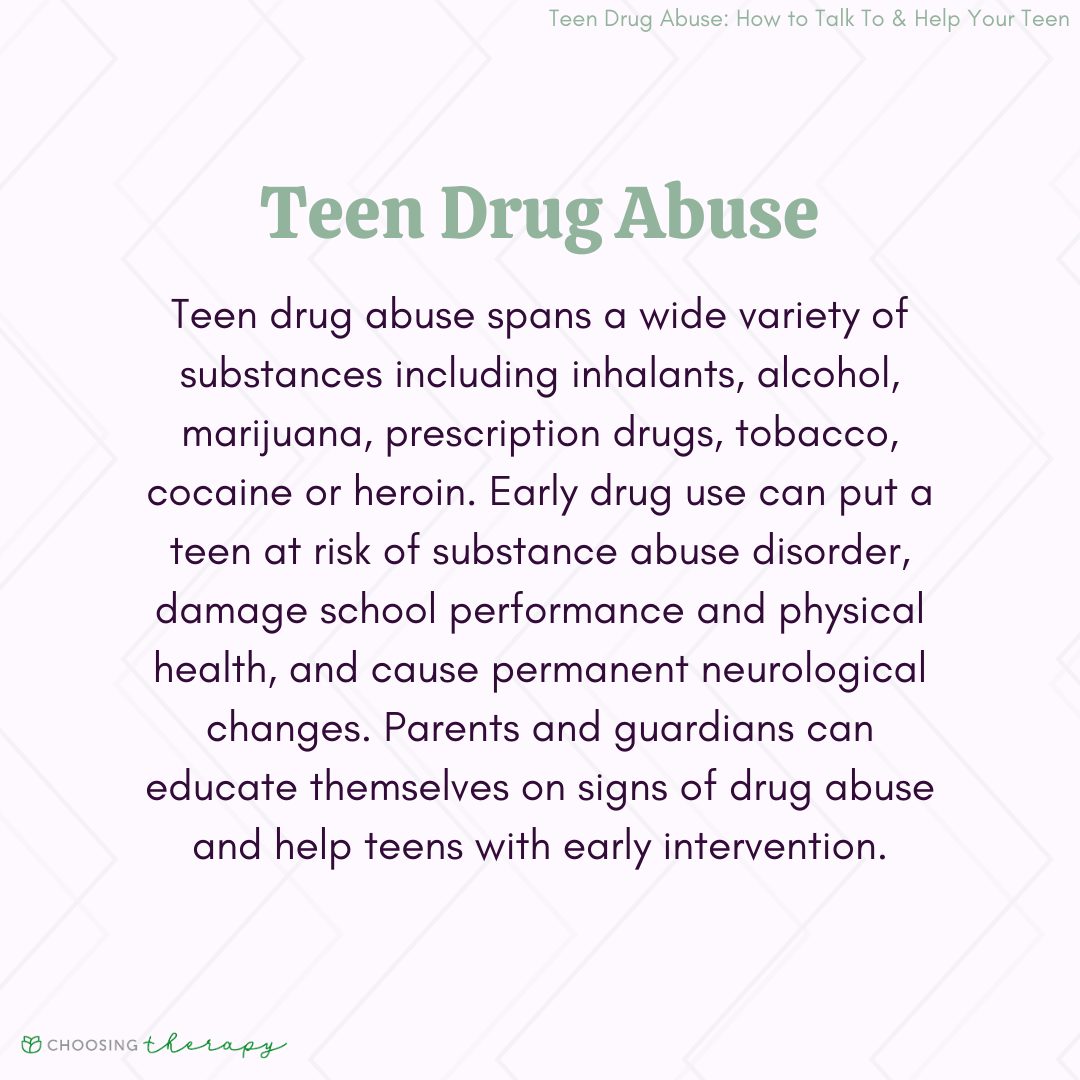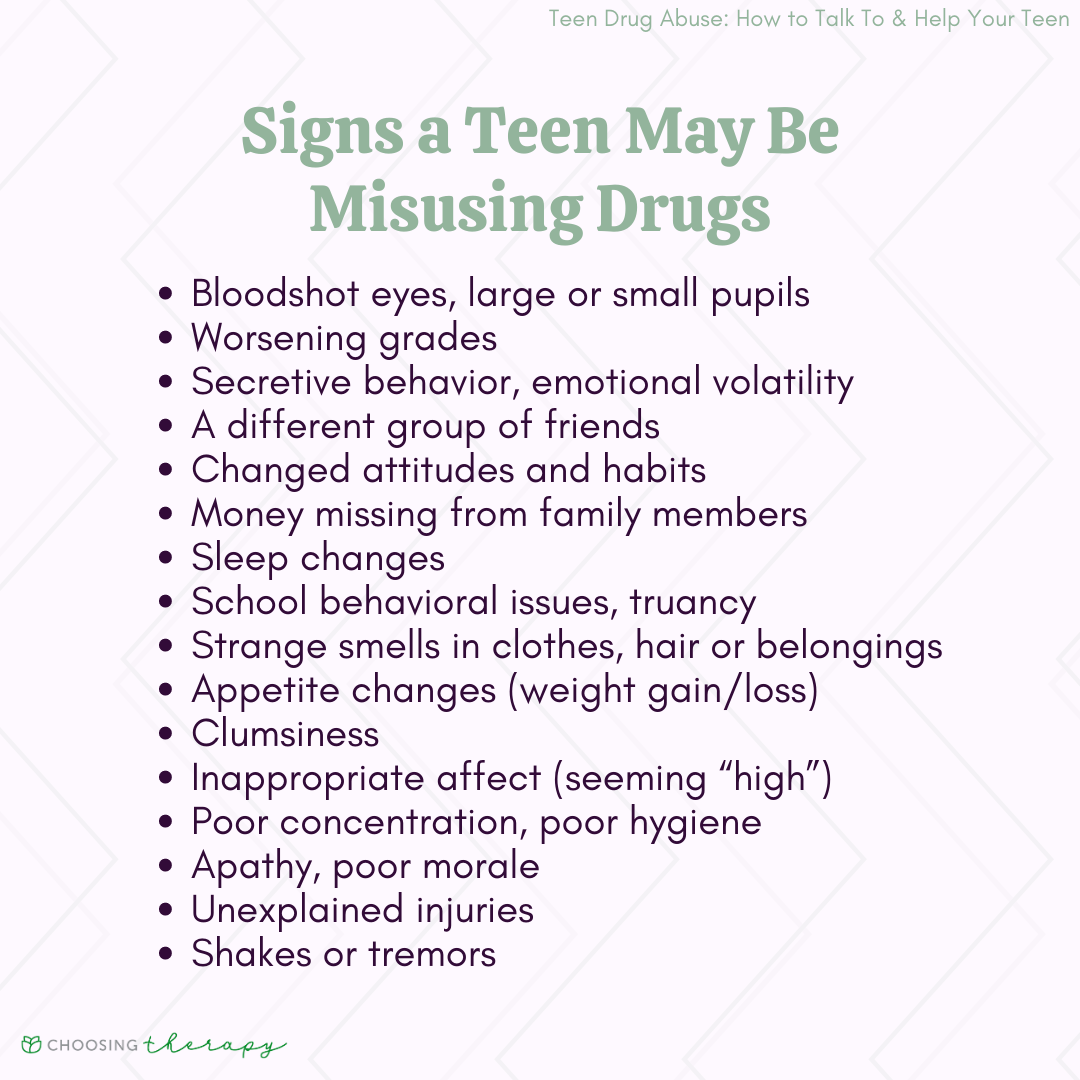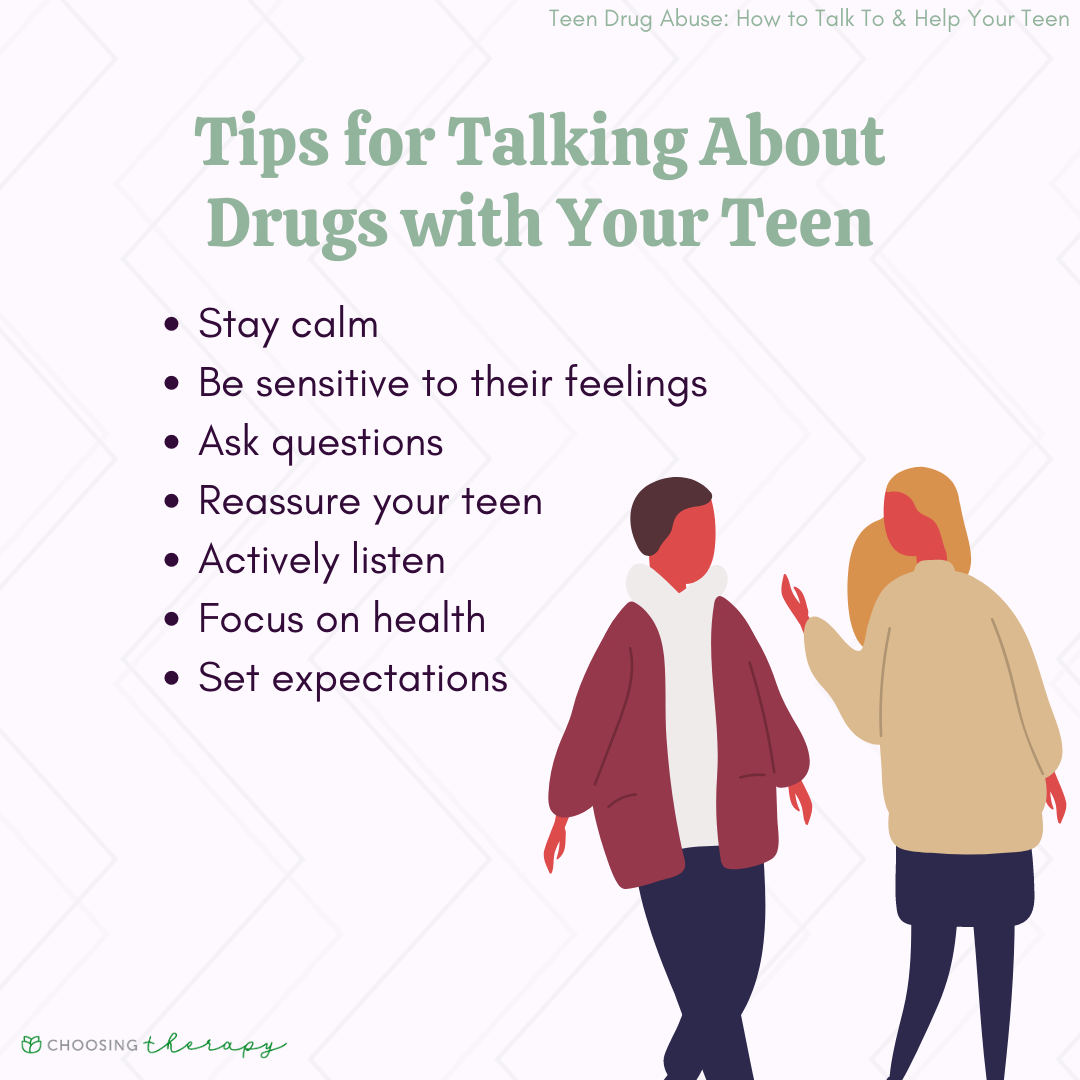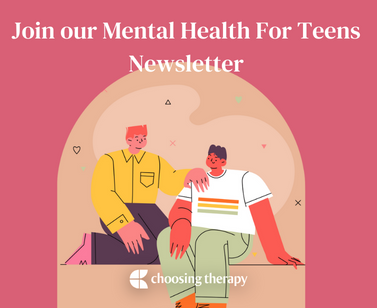Teen drug abuse spans a wide variety of substances including inhalants, alcohol, marijuana, prescription drugs, tobacco, cocaine or heroin. Early drug use can put a teen at risk of substance abuse disorder, damage school performance and physical health, and cause permanent neurological changes. Parents and guardians can educate themselves on signs of drug abuse and help teens with early intervention.
Charlie Health - Therapy Once Per Week Isn’t Always Enough Charlie Health’s virtual mental health program includes curated peer groups, individual therapy, and family therapy for teens and young adults with serious mental health issues. Insurance accepted. Learn More
How Widespread is Teen Substance Abuse?
Initiation of drug use during adolescence is widespread and common. The majority of use begins with widely available drugs such as alcohol, marijuana and prescription medications.
The 2021 “Monitoring the Future” survey reported significant decreases in the use of substances, including those most commonly used in adolescence – alcohol, marijuana, and vaped nicotine in 10th, 11th and 12th graders.1 According to the same survey in 2019, 4 of 10 students have used alcohol by the end of their senior year. Alcohol remains the most commonly used substance among teens. While the decreases in this age group are encouraging, drug use is still quite common among teens.
The Covid-19 pandemic seemed to affect adolescent drug use significantly, decreasing the initiation and frequency of the use of some drugs, while increasing the potential harm in the way drugs are being used. Binge alcohol use is common and tobacco or marijuana delivered via vaping are highly potent and popular among teens. Decriminalization and legalization of marijuana has made it widely available in high concentrations. Today’s youth are facing unprecedented amounts of deadly fentanyl in the illegal drug supply as well.
Why Teens Abuse Drugs
Drug abuse is prevalent among teens for many reasons. One reason can be attributed to their developing sense of independence with risk taking playing a role in promoting feeling independent. Teens are at a critical stage of neuro-cognitive development during which they are less able to understand and weigh the long term effects or potential risks of their behaviors. The prefrontal cortex of the brain is not fully developed until the age of 25-26. Perception of dangerousness of substances may be adversely affected by legalization and decriminalization of marijuana and “pro-drug” content on the internet may also play a role in normalizing drug use.
A 2021 meta-analysis of 22 quantitative and one qualitative study of drug abuse in teens cited some of the risk factors as “the presence of early mental and behavioral health problems, peer pressure, poorly equipped schools, poverty, poor parental supervision and relationships, a poor family structure, a lack of opportunities, isolation, gender, and accessibility to drugs”.4 ACES (Adverse Childhood Experiences) are correlated with an increased likelihood of drug abuse later in life.
Here are common reasons teens may abuse drugs:
- Novelty seeking/experimentation
- Fitting in socially
- Coping with life transitions
- Managing pain or other physical concerns
- Managing mental health conditions such as anxiety or depression
- Dealing with disappointments
- Performance improvement
- Peer pressure
- Feeling grown up
- Boredom
- Genetics/family history
Signs Your Teen May Be Abusing Drugs
Teen drug use ranges from subtle to obvious, often depending upon the degree and seriousness of the issue. Sometimes the first sign is a change in the teens normal demeanor or habits. A teen abusing drugs may appear suddenly more secretive, spending more time isolated or away from home. A parent may notice greater agitation or volatility in the youth, apathy, a sudden issue with grades or getting up in the morning. Some drugs have more obvious effects, leaving clothes smelling of smoke or making the teens eyes bloodshot while others can be virtually undetectable.
Popular Options For Teen Mental Health Talkspace – Online Therapy For Teens. A space for your teen to talk about what’s going on, develop coping skills, and start feeling better. Covered by most major insurance plans. Get Started Charlie Health – Therapy Once Per Week Isn’t Always Enough. Charlie Health’s virtual mental health program includes curated peer groups, individual therapy, and family therapy for teens and young adults with serious mental health issues. Insurance accepted. Learn More Equip – Eating Disorder Treatment That Works – Delivered At Home. Are you worried that your child has an eating disorder? With the right treatment, lasting recovery is 100% possible. Equip offers virtual evidence-based care, so you can help your loved one recover at home. We take insurance! Get a Consultation
Teens may hide drug use in many ways. They may use drugs at friend’s homes, cover their bloodshot eyes with Visine, search medicine cabinets for prescriptions, or skip school in order to use. Even the physical effects of drugs can be plausibly explained away as being “tired” or “sick” at first. Many signs of drug use look quite similar to normal developmental behaviors and in today’s busy families, drug use can be missed. Family involvement, spiritual or religious practices, and extracurricular activities are correlated with less drug use among teens.
Signs a teen may be misusing drugs include:
- Bloodshot eyes, large or small pupils
- Worsening grades
- Secretive behavior
- A different group of friends
- Changed attitudes toward family members
- Money missing from family members
- Emotional volatility
- Difficulty waking up in the morning
- Truancy
- School behavioral issues
- Changes in habits
- Strange smells in clothes, hair or belongings
- Sleep changes
- Appetite changes (may also cause weight gain or loss)
- Clumsiness
- Inappropriate affect (seeming “high”)
- Poor concentration, drowsiness
- Poor hygiene
- Apathy, poor morale
- Unexplained injuries
- Shakes or tremors
Consequences of Teen Substance Abuse
Teens may have difficulty understanding how their drug use is problematic. Experimentation may not have obvious ill effects at first and for some teens may stop there. In the short term, teen drug use may lead to lowered inhibitions and poor decision making. Physical effects such as hangovers, or withdrawal symptoms are common. Behavioral effects even in the short term can be depressive symptoms, paranoia, feeling irritable. Drug seeking and use may also affect the quality of relationships, schoolwork or performance in sports or extracurricular activities.
Longer term effects of drug use can be more serious as the teen develops increased tolerance and physical and/or emotional dependence on the drug. Withdrawal from some drugs can be painful or even dangerous. Long term use of many drugs permanently changes the brain of the user. “Using data from the longitudinal Brain and Alcohol Research in College Students (BARCS) study, Meda et al. report that, compared to the typical decline in gray matter volume associated with adolescent neurodevelopment, young adults who engage in heavy drinking display greater volume loss in regions such as the frontal cortex and hippocampus.”2 Long term drug use may also result in legal involvement, accidents and trying other drugs as well.
Teens who abuse drugs may experience negative consequences, such as:
- Poor judgment: Driving while impaired, carelessness with sexual behaviors, or choosing drug use over school assignments are common examples.
- Drug dependence: when experimentation gives way to regular use, the teen can develop tolerance to the drug and eventual dependence.
- Changes in brain chemistry: Teenage addiction results from the reinforcing effects of neurotransmitters such as dopamine being released during drug use. With the development of dependence the pleasure centers of the brain are hijacked.
- Risk of death: Teens may purchase drugs without knowing what they contain or how potent they are. Fentanyl is a dangerous and powerful opioid being sold on its own or mixed with cocaine, heroin, methamphetamine or other prescription opiates. It is responsible for a high percentage of fatal and non-fatal overdoses.
- Poor performance: Drug use often negatively affects performance in school, at work or in extracurricular activities.
- Relationship impairment: Over time drug involvement is often described as “having a relationship” with the drug of choice. This is meant to describe how drug seeking and use become the most important thing, replacing quality relationships with friends, significant others and family members.
When to Talk to Your Teen About Drugs
Talking to your teen about drugs need not be one long lecture, looking for teachable moments is a good strategy. An ideal approach is a series of conversations, beginning when they are as early as nine. Kids can be introduced to what drugs are, which are legal and illegal and they can understand how drugs can be harmful to people.
Kids may be aware if there is a family member who has suffered from the disease of addiction and this can be an entry point for the conversation. The issue of predisposition can be brought up as well as information about how early use is demonstrably correlated with a higher likelihood of addiction. It is critical to have these conversations long before a child has begun experimenting. Some kids begin experimenting as early as 12-14 years of age. Don’t wait.
7 Tips for Talking About Drugs With Your Teen
Approaching teens on the topic of drug use relies upon the development of a good relationship in general. Teens are more approachable if they feel that you approve of them and see them as intelligent and capable. It is a much more successful strategy to use natural openings such as situations that the kids bring up as a lead rather than to launch into a long lecture. Often there are units in school on the topic which give an opening to further discussion at home. These discussions work best if they are short and frequent instead of arising for the first time when a teen is asking permission to go somewhere where you suspect there might be alcohol or drugs.
Talkspace - Online Therapy For Teens Talkspace offers online therapy for teens with subscriptions starting at $69 per week. Costs may be even lower with Cigna, Optum, and UHR insurance. Meet with a licensed therapist for weekly sessions and on-going messaging.
Some parents may find themselves having to talk to their teens about drugs when they believe the teen has already experimented or may be lying about drug use. These conversations are even more delicate. It will help to prepare in advance by getting on the same page with your partner and gathering any evidence. When you sit down with your child, be prepared for your own use of substances to get called out. Stay calm and keep your expectations of the conversation low. Express your concerns, your love for your child and your belief that your child is capable of understanding your concerns.
Below are 7 tips for discussing drugs with your teen.
1. Stay Calm
It is vital to maintain your composure and not allow feelings of fear disrupt your teens ability to share honestly. Early conversations set the tone for future ones. If your teen feels that coming to you causes anger and frustration they may be less likely to do so in the future.
2. Be Sensitive to Their Feelings
Acknowledge that it is a sensitive topic and that everyone will feel uncomfortable. If you suspect that some of your teen’s friends are already actively using drugs, avoid calling them out. Instead, ask if there is anyone in their immediate circle they have concerns about. It can help to brush up on tips for how to communicate before your conversation.
3. Ask Questions
Asking questions to understand their perspective on teen drug use and what experiences they or their friends may have already had. Ask how they would approach hypothetical experiences. Show curiosity about their views and where they may have come from.
4. Reassure Your Teen
Reassure your teen that you love them and that the conversation is coming out of concern for their health and wellbeing, not out of a desire to impose your values on them.
5. Actively Listen
Use your best active listening skills. Reflect back what your teen shares, check in and make sure that your perception is accurate. Make sure that you are not just looking for opportunities to impress your viewpoint on your child. Mutuality and open communication offers the best chance of long term success.
6. Focus on Health
A good strategy is to focus on their health. Just like eating a good diet or exercising, a sober lifestyle is a choice that can be made for current and future health. Teens may also be open to information about the effect of drugs on their developing brain and a conversation about how putting off trying legal substances until their adulthood would be beneficial.
7. Set Expectations
Set expectations about not allowing illegal substances in your home. Give them an “out” for uncomfortable situations that may arise as they become more independent. Let them know you will pick them up no questions asked if they are at a party with drugs or alcohol or have been drinking and do not have a safe ride home.
Discussing Addiction with Your Teen
Explain addiction vs. dependence to your teen. Acknowledge that no one intends to become addicted. Share with them that one drug experience with certain classes of drugs, such as opiates, can cause immediate addiction or even death, but most addiction starts with experimentation.
Teens can understand the four step cycle of addiction. Talk about them in simple terms. The feelings caused by drugs are highly reinforcing to the brain. Over time, not having drugs causes craving. Craving is uncomfortable and the sufferer loses control of the amount or frequency of use. Use becomes compulsive, and then drugs are used despite the consequences.
Getting Treatment for Teen Drug Abuse
If a parent believes their teen is already using drugs they can begin with finding a therapist who specializes in working with teens and substance abuse. While many therapists may be helpful, therapists who specialize in teen addiction can help determine the correct level of care for your teen and evidence based approaches to the problem. Online therapy options can be a good place to start as teens are often more comfortable with this option.
Charlie Health - Therapy Once Per Week Isn’t Always Enough Charlie Health’s virtual mental health program includes curated peer groups, individual therapy, and family therapy for teens and young adults with serious mental health issues. Insurance accepted. Learn More
Therapy methods that can be effective for teens abusing drugs include:
- Cognitive behavioral therapy (CBT): CBT can be beneficial for teens abusing drugs because it can help them identify and change unhelpful thoughts and behaviors that are leading to drug use.
- Dialectical behavior therapy (DBT): DBT can be a beneficial way for teens abusing drugs to develop mindfulness, emotional regulation and distress tolerance. They can also use this targeted therapy to develop more adaptive behaviors.
- Group therapy: Group therapy can be particuarly helpful for teens to connect with others in a non-judgemental and supportive atmosphere. Knowing they are not alone can be a meaningful way for teens to acknowledge that they have an issue and find ways to cope successfully.
- Motivational Interviewing: Motivational Interviewing is an intervention that helps even the most resistant person become willing to make positive changes. Motivational Interviewing meets the person where they are and leverages ways the person wants to change to make small attainable gains toward harm reduction and eventual abstention.
- Intensive outpatient therapy: Intensive Outpatient Therapy (IOP) may be needed if a teen is highly dependent or addicted. Being in an intensively therapeutic atmosphere can be a means of bringing in a range of disciplines and wrapping expert help around the teen while not requiring an inpatient stay.
- In Patient Therapy: In Patient therapy is sometimes required for teens whose addiction involves a high degree of compulsive use, withdrawal, or polysubstance abuse. An assessment, called the ASAM, will determine if this is the recommended level of care. Typical in-patient treatment is 28 days but can be longer or shorter, depending on the person’s needs.
An online therapist directory can help narrow the choices of therapist for your teen. You might also consider speaking to their primary care doctor.
In My Experience
In my experience, teens are exposed to drugs at an earlier age than most parents would guess. Talking to teens about drugs early and often is vital. Some teens may be at a higher risk than others. These teens benefit from clear and honest communication about their risk.
Addiction is a serious but treatable illness. Take advantage of some of the evidence based approaches to the treatment.
To help our readers take the next step in their mental health journey, Choosing Therapy has partnered with leaders in mental health and wellness. Choosing Therapy is compensated for marketing by the companies included below. Neurological Testing Neuropsychological Testing For Children (including evaluations for Autism Spectrum Disorder, ADHD and Learning Disorders) Get answers in weeks, not months. Bend Health provides a complete report with in-depth findings, review with your schools, and a clinical diagnosis (if applicable). Learn more Online Therapy & Coaching (ages 1 -17) Bend Health is a virtual mental healthcare provider caring for kids, teens, and their families. Many insurance plans are accepted. Learn More Online Therapy TeenCounseling (ages 13 -19) – Help your child thrive with professional counseling. Get matched with a licensed therapist who specializes in teens. Discuss your child’s issues and situation. When you approve, the therapist is connected with your child. The therapist interacts with your child over text, phone, and video. Starting for as little as $65 per week. Get Started DBT-Focused Therapy For Teens Charlie Health’s virtual mental health program includes curated peer groups, individual therapy, and family therapy for teens and young adults with serious mental health issues. Insurance accepted. Learn More Eating Disorders and Teenagers Equip – Worried your child might have an eating disorder? It can be overwhelming when your child is showing eating disorder red flags, but you can help. In fact, your help may be critical to getting them the right treatment. Learn more about the signs of eating disorders and what to do if you’re concerned. Explore Equip’s free guide.Additional Resources
For Further Reading
- Substance Use Resources for Teens
- Resource List by Teen Safe
- Substance Abuse and Mental Health Services Association National Helpline
- How to Tell If Your Teen Is Benefiting From Therapy
- Best Options for Online Therapy for Teens
- Supporting Your Teen After Their Therapy Session
- Cognitive Behavioral Therapy (CBT) for Addiction
- Cocaine Withdrawal Symptoms
- GHB: Effects & Hazards
- Prescription Drug Abuse: Signs, Types, & Treatments
- Vaping: What It Is, Side Effects, & Risks
- What Is Chroming? Definition & Dangers
OCD in Teens: Signs, Symptoms, and Treatment OCD symptoms are hard enough on fully developed adults—but what about teens who begin to exhibit signs and symptoms of obsessive-compulsive disorder (OCD) just as they’re growing into their individualism and sense of self? Unfortunately, that’s the way it is for many, as OCD most commonly develops in teen and adolescent years.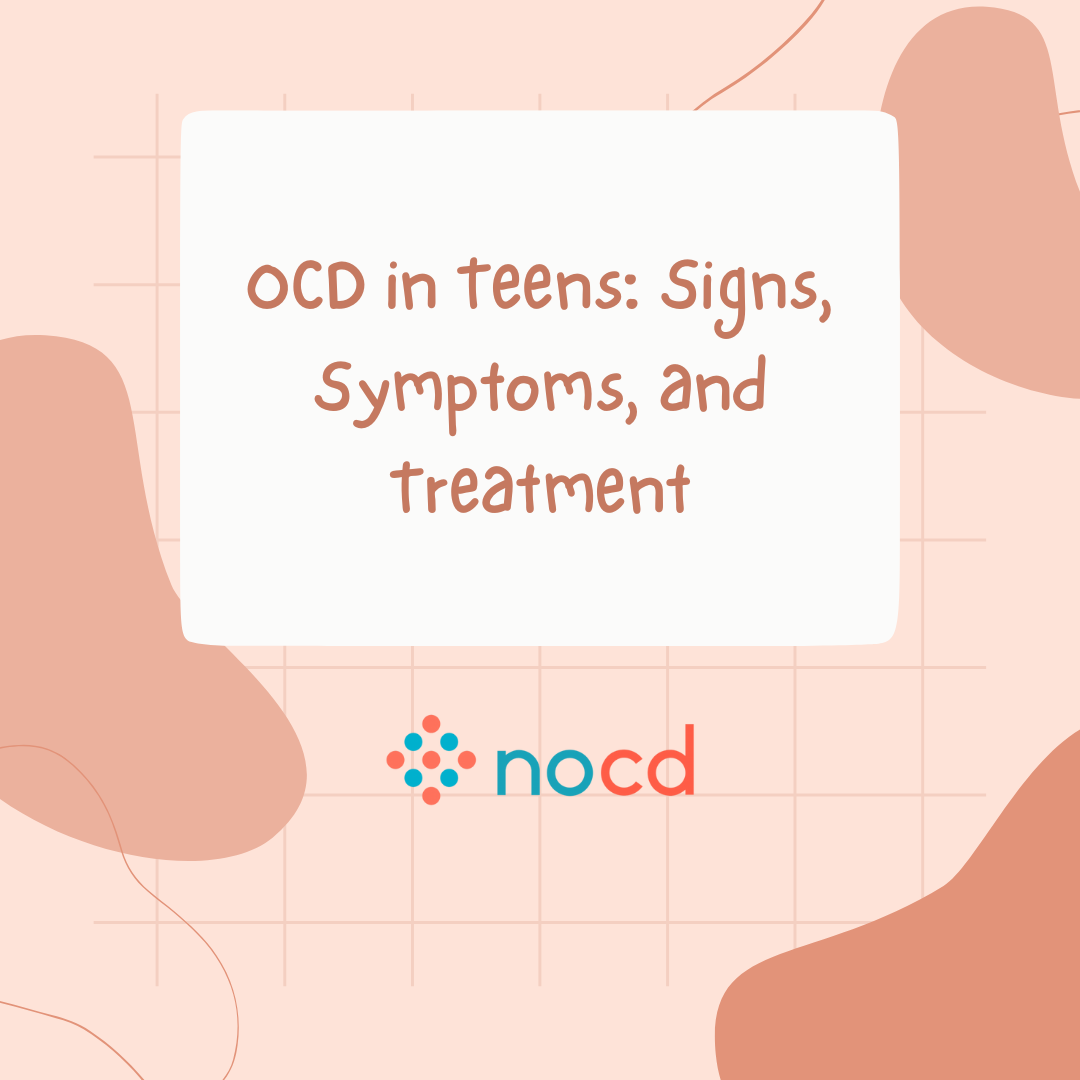
Best Options for Online Therapy for Teens With so many truly amazing online therapy options for teens, choosing one can be difficult. Some of the most important factors to consider before selecting a company are your budget, who takes your insurance, which ones can answer your questions, and most importantly, who your teen likes the best. Supporting and listening to your teen is crucial for a successful therapy experience.